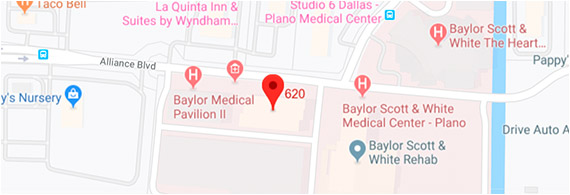Eye Conditions
Conveniently located to serve Dallas
Office Locations: Irving | Plano | Southlake
Common Eye Conditions
Glaucoma
is a condition where the nerves in your eye become damaged. It happens most often when pressure builds up in the eyeball and crushes or damages the nerves in some way. This damage often results in blindness in the affected eye. In most forms of glaucoma, the pressure is caused by the eyeball not draining its internal fluids correctly. Glaucoma can be slowed or prevented if it is caught in time, however, without proper preventative treatment, it will cause irreversible blindness. If you suffer from severe headaches, nausea, eye pain, or impaired vision, you should seek help from an Ophthalmologist immediately.
Diabetic Retinopathy
is a complication from diabetes when the light-sensitive tissue in the retina is damaged. While at first there will be mild or even no symptoms, diabetic retinopathy will always result in blindness. Patients who are at risk for retinopathy include people with type 1 or 2 diabetes. Uncontrolled or poorly controlled blood sugar levels will exasperate the likeliness that you will contract this condition. Symptoms in the later stages include “floaters,” impaired vision, blurred vision, or dark spots in the patients’ vision. These symptoms will most likely be present in both eyes. This complication can end in blindness, so early prevention is critical.
Dry Eye Syndrome
is when the glands located around your eyes don’t produce enough tears. Tears are a unique substance composed of water, oil, mucus, and antibodies. This substance keeps the eyes lubricated, clean, and moist. Dry eyes can be caused by any number of things, and can also occur when one of the four tear components are missing. Sometimes, simple issues such as an air conditioning system or the natural aging process can cause dry eyes. However, the condition can also be caused by more severe problems like a drug reaction, Sjogren’s syndrome, and issues with your eyelids. Visit LaserCare Eye Center today to take our dry eye exam.
Macular Degeneration
is an age-related disease that occurs when the macula, the central portion of the retina, degenerates. This degeneration causes large blind areas in the center of the patients’ field of vision. It is the leading source of vision loss for senior citizens, and while it doesn’t cause total blindness, it is considered a significant disability. Macular degeneration is caused in two ways. The first and most common type is caused by yellow fat deposits building up in the macula, degrading the tissue. The second type is wet form degeneration, where fluid leaks from the blood vessels into the retina. Early detection is critical in treating the progression of the disease.
Pterygium
also called surfer’s eye or eye webs is a growth that develops on the clear tissue of the eyelid and can spread into the cornea. It is very common in people who spend extended amounts of time in the sun, though it can also be caused by dry eye as well. The good news about this condition is that it isn’t cancer despite being a growth. The bad news is that it can be irritating, but can also spread to your cornea and affect your vision. Luckily, this condition is easily treatable with prescription eye drops and at worst having the growth cut off in extreme cases.
Treatments for Eye Conditions
While there are a wide variety of home treatments available for certain common eye conditions, it is still highly recommended to come in for a professional examination first. There are many occasions where symptoms can mimic those of one eye condition while actually stemming from another condition entirely.
Following a professional examination, home treatments may be recommended if the eye condition has yet to reach a critical stage. If it is discovered that the eye condition has progressed to a point where home or over-the-counter remedies will no longer be enough, surgical solutions may be necessary.
Your Consultation
Patients will need to schedule a consultation to have their eyes examine if they are experiencing symptoms that indicate an eye condition. Their eyes will be examined by one of our skilled doctors, and the patient will be asked questions about the symptoms they have experienced. Their medical history will also be discussed for further clarification.
Once the particular eye condition has been diagnosed, a treatment option will be recommended. Treatment will be explained in detail, and any concerns can be addressed.
How Much Do Treatments for Eye Conditions Cost?
The cost for treatments for eye conditions will depend on the type of eye condition being experienced and the exact treatment being employed. Price will vary from case to case.
Schedule a Consultation for Eye Condition Treatment
Contact us to learn more about our treatment options for eye conditions in Southlake and surrounding areas. Arrange your appointment today.




